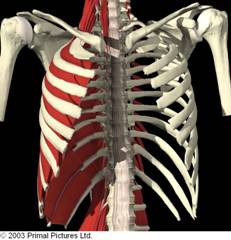Intercostal Muscle Strain: What is it?
The thoracic spine consists of twelve vertebrae which each connect to a pair of ribs. The upper seven ribs are connected directly to the chest bone/sternum and are termed true ribs, whereas the lower five ribs do not attach directly to the sternum and are defined as false ribs.

The intercostal muscles consist of several groups of muscles (internal and external intercostals and subcostal and transverse thoracic muscles) which are located between the ribs and function to move and stabilise the chest wall.
These muscles can become strained, often as a result of rapid twisting of the torso, and are common in sports such as basketball and tennis.
Muscle strains have three gradings:
- Grade I Strain: this is a mild strain and only some muscle fibres have been damaged. Healing occurs within two to three weeks.
- Grade II Strain: this is a moderate strain with more extensive damage to muscle fibres, but the muscle is not completely ruptured. Healing occurs within three to six weeks.
- Grade III Strain: this is a severe injury with a complete rupture of a muscle. This typically requires a surgical muscle repair; the healing period can be up to three months.
Symptoms of Intercostal Muscle Strain
Symptoms commonly reported are sharp, stabbing pains when breathing to an ever-present, painful ache or soreness around the ribcage. The pain is aggravated by deep breathing, side bending and twisting.
The degree of disability, along with the rate of recovery, will depend on the grade of the muscle strain. Given above is a general guideline as to the rate of recovery from a muscle strain per se, however, the healing time may be longer due to our constant need to breathe and, therefore, low-grade irritation to the healing site.
Content note: The list of conditions given above and subsequent explanations are intended as a general guide and should not be considered a replacement for a full medical examination. Furthermore, we do not purport to treat all the conditions listed.
Treatment: Book an appointment with Bodymotion
Our team of chiropractors and massage therapists are on hand to answer any questions you may have, so get in touch today via enquiries@body-motion.co.uk or on +44 (0)20 7374 2272.
